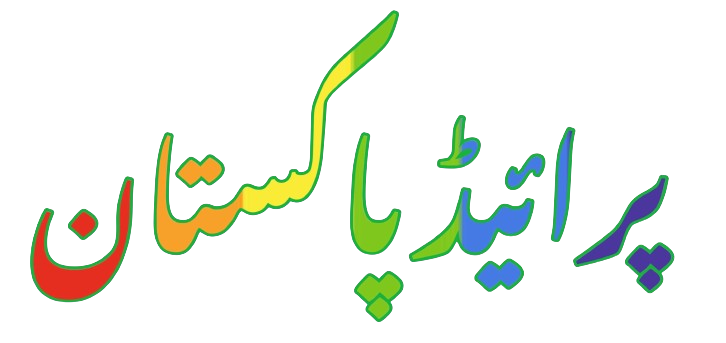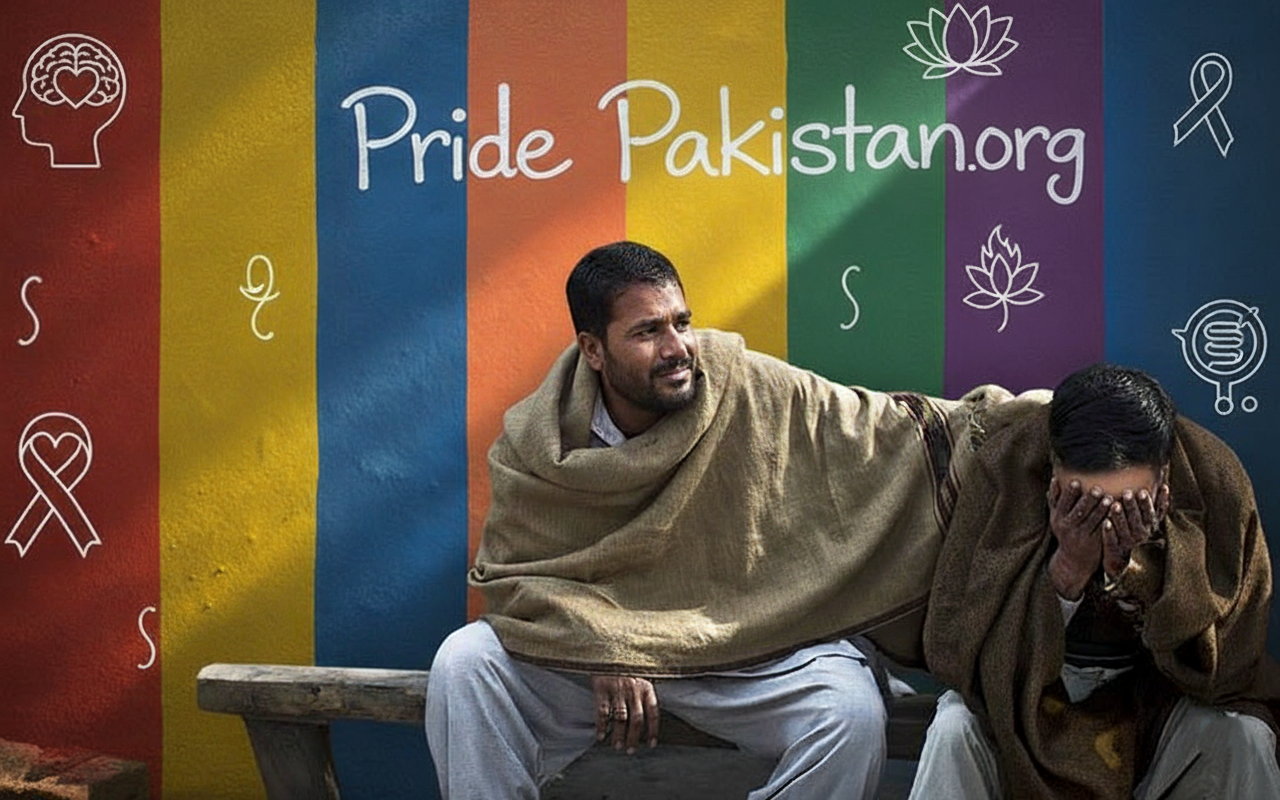We hear your pain. Every message we receive about the unbearable psychological pressure, the fear of family honor, the forced marriages, and the deep emotional toll of living in the closet, breaks our hearts. We know that behind every message is a story of immense courage and silent suffering. We understand the despair that leads to thoughts of suicide and the tragic reality that too many of our community members have been lost to this battle.
At PridePakistan.org, we want you to know you are not alone. Your identity is not a disease. Your feelings are valid.
While our organization does not have the funds to provide free, professional psychological services, what we can do is empower you with the knowledge and tools to seek the help you need, safely and discreetly. This page is a guide to finding mental health support, both in Pakistan and globally, with a focus on your well-being and security.
Navigating Mental Health Care in Pakistan
We know that finding a supportive mental health professional in Pakistan can be a challenge. The fear of being judged, facing religious sermons, or being told that your identity is a “disease” is a very real and terrifying barrier. We have heard your stories, and we acknowledge the deep wounds caused by such encounters.
When seeking help in Pakistan, your first priority is your safety and privacy.
We advise you to approach mental health professionals with a focus on your symptoms and well-being, without necessarily disclosing your sexual orientation or gender identity upfront. You are the expert on your own life. You have the right to seek help for the mental health issues you’re facing—be it anxiety, depression, stress, or trauma—without having to justify or explain who you are.
Check for Professional Ethics: Look for professionals who are registered with reputable psychological associations. They are bound by professional ethics that prioritize patient care over personal beliefs.
Focus on Symptoms, Not Identity: Instead of saying, “I am depressed because I am gay,” you can say, “I am struggling with deep depression and anxiety. I feel immense pressure from my family and society, and it’s making it hard to function.”
Build Trust Gradually: If you find a professional who is supportive and empathetic, you may choose to reveal more of your identity later, but you are never obligated to do so. Your mental health is the priority.
Pakistan-based mental health services
Below are options grouped by government, private platforms/directories, and associations/NGOs. We’ve highlighted how to access them, what they offer, and general cost notes. Verify current fees and hours on the official pages.
Government and academic services in Pakistan
| Service/platform | Access | Services | Typical cost | Notes |
|---|---|---|---|---|
| Humraaz 1166 Government app and helpline | Call 1166 or mobile app | Mental health support referral, guidance | Free | Government-backed; can request mental health help without disclosing identity details. |
| National Institute of Psychology (NIP) Counselling | https://nip.edu.pk/counselling/ | Counselling via university services (online/in-person) | Low/varies | Academic setting; ask about availability, sliding-scale fees, and privacy. |
Private platforms and directories in Pakistan
Sehat Kahani (Online Doctors): While not exclusively for mental health, this platform connects patients with doctors, including psychologists, via video consultations.
- Services: Online consultations, with the option to speak to a psychiatrist.
- Contact: https://sehatkahani.com/
- Charges: Varies based on the doctor.
| Service/platform | Access | Services | Typical cost | Notes |
|---|---|---|---|---|
| Find a Helpline Pakistan | https://findahelpline.com/countries/pk | Crisis helpline directory phone/chat | Free to access | Aggregates verified hotlines and chats; pick what feels safest. |
| Marham | https://www.marham.pk/doctors/psychologist | Book psychologists/psychiatrists | Paid; provider-set | Filter by online sessions; ask for symptom-focused care. |
| SehatYab | https://www.sehatyab.com/ | Online therapy and psychiatry | Paid; provider-set | Compare fees, languages, and availability. |
| ApkaMuaalij | https://www.apkamuaalij.com/ | Mental health providers | Paid; provider-set | Check reviews and request video sessions. |
| Ruhbaru | https://www.ruhbaru.com/ | Online counselling | Paid; provider-set | Ask about sliding-scale or package discounts. |
| PakMH Service providers | https://pakmh.com/service-providers/ | Pakistan mental health directory | Varies | Directory listing; verify credentials and fees directly. |
| TherapyMantra Therapists | https://therapists.therapymantra.co | Global/PK therapist matching (online) | Paid; plans vary | Ask for nonjudgmental, evidence-based care; book trial calls if offered. |
Associations and NGOs in Pakistan or serving Pakistan online
| Service/platform | Access | Services | Typical cost | Notes |
|---|---|---|---|---|
| Taskeen Mental health helpline | https://taskeen.org/program/mental-health-helpline/ | Helpline, psychoeducation, referrals | Often free/low | Check site for current contact method (phone/WhatsApp/hours). |
| Dawn featured | https://images.dawn.com/news/1185033 | Article listing mental health supports | Free | Use as a starting point; verify each provider. |
Global LGBTQIA-friendly online resources
These can be accessed from Pakistan subject to connectivity. If speaking with LGBTQIA-informed peers feels safer, consider these. If you prefer not to disclose identity, you can still describe symptoms and stress.
| Service/platform | Access | Services | Typical cost | Notes |
|---|---|---|---|---|
| LGBT National Help Center | https://lgbthotline.org/ | Peer support hotlines and chats | Free | Hotline availability posted on site; includes youth/senior lines. |
| LGBTIQ Helpline | https://www.lgbtiq-helpline.ch/en | Peer advice by chat/email; phone line | Free | Phone: 0800 133 133; English support via email/chat. |
| HRC Mental health resources | https://www.hrc.org/resources/mental-health-resources-in-the-lgbtq-community | Curated hotlines and supports | Free | US-focused but useful lists and coping guidance. |
| Gaysians Resources | https://www.gaysians.org/resources | Curated South Asian LGBTQIA resources | Free | Mix of urgent and non-urgent supports. |
Paying for care when funds are limited
- Ask for sliding-scale fees: Many private clinicians reduce fees based on need.
- Prefer telehealth: Often cheaper than in-person and safer for privacy.
- Short-term, skills-focused therapy: Request CBT/DBT tools for immediate coping over fewer sessions.
- Medication consults: A psychiatrist can discuss options; ask about generics and follow-up spacing to reduce cost.
If you face discrimination or “conversion” attempts
No one has the right to shame you, preach at you, or deny evidence-based care. “Conversion therapy” is harmful and not a medical treatment. If a clinician discriminates, preachifies, or refuses proper care:
- Set a boundary: “I’m here for mental health treatment, not religious counseling.”
- Ask for referral: “Please refer me to a different clinician.”
- Document details: Note date, time, name, what was said.
- Report it: Share what happened so we can help track and act.
Report discrimination here: Click Here
Practical grounding if you’re overwhelmed right now
- Breathing reset: Inhale 4 seconds, hold 4, exhale 6; repeat 5 times.
- Temperature shift: Wash your face with cool water; it can reduce acute panic.
- Name five things: 5 things you see, 4 you feel, 3 you hear, 2 you smell, 1 you taste.
- Delay the impulse: Commit to waiting 24 hours before taking any harmful action and connect with one resource above.
- Safety plan: Write 3 warning signs, 3 coping actions, and 3 people/lines you can contact.
You are worthy of care, respect, and a life without fear. If you want, tell me what would feel most helpful right now, a script to text a doctor, a shortlist of low-cost providers, or help drafting a safety plan.


Leave a Reply